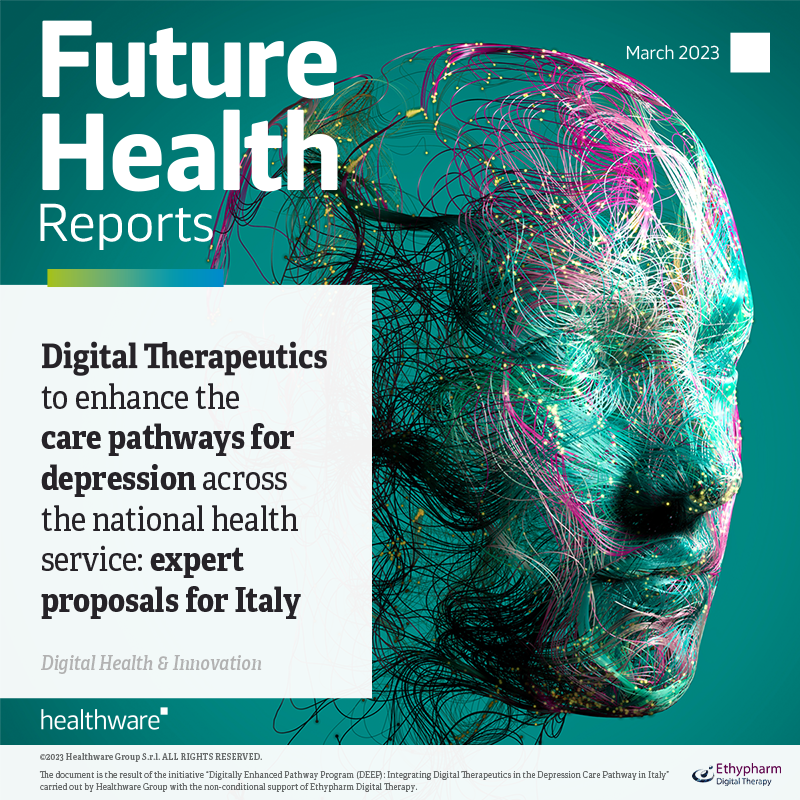The document describes five expert proposals and a possible clinical-organizational process for the integration of Digital Therapeutics across depression care pathways in the Italian national health service, formulated by a multistakeholder panel coordinated by Alberta M.C. Spreafico, Global Head of Digital Health & Innovation at Healthware Group, and Fabrizio Starace, Director of the Department of Mental Health and Pathological Dependencies of the AUSL of Modena.
Milan, Italy | 28 March 2023 – Healthware Group released the Expert Opinion “Digital Therapeutics to enhance the care pathways for depression across the national health service: expert proposals for Italy“[1]: elaborated by a multistakeholder panel that, accounting for unmet needs and recent evidence-based scientific recommendations for the treatment of depression, proposes integrating Digital Therapeutics (DTx) to enhance care-as-usual within the Italian national health service (Servizio Sanitario Nazionale, SSN) for mild, moderate, and severe depression, as well as for the prevention of relapses and management of subthreshold depression.

The experts also analysed the case study of a DTx indicated for the treatment of unipolar depression or depressive disorders, already accessible and reimbursed in other European countries and supported by substantial clinical evidence (12 Randomized Controlled Trials and a meta-analysis involving over 2900 patients)[2], to define a possible clinical-organizational process suitable for the integration, prescription and adoption of DTx in the context of the SSN.
The Expert Opinion is meant to contribute to the current institutional, scientific, and cultural debate on the digital health transformation in Italy.
In Italy, mental health disorders are the fifth leading cause of Disability Adjusted Life Years[3] and account for direct and indirect costs that exceed 3% of GDP[4]. Depression is the most common mental health disorder, with more than 3 million people suffering from depressive symptoms[5] and rising prevalence rates due to the COVID-19 pandemic[6].
Despite the significant health and socioeconomic impact of depression, numerous unmet needs persist across care pathways and dedicated services remain underfunded within the SSN. Only 8% of patients accessing public mental health services benefit from psychotherapy[7], although being amongst first-line treatments for depression[8]. It is also estimated that the SSN could only address 20% of the need for psychotherapy for anxiety and depression[9]. There are also challenges and gaps in providing continuous, and integrated care; supporting patients towards gradual autonomy, empowerment, and recovery; and monitoring and intervening promptly in cases of relapses.
In this context, DTx that deliver to patients evidence-based therapeutic interventions driven by high quality software programs to treat, manage, or prevent a disease or disorder, represent an opportunity to complement and enhance care pathways, enabling more effective, personalized, integrated and proximity-based models of care – in line with the priorities delineated by the recent Global Mental Health Summit and the National Recovery and Resilience Plan (PNRR). Particularly, their systemic integration could effectively increase accessibility to validated psychotherapeutic interventions in a scalable manner.
Digital therapeutics are an important instrument for improving access to specialist care, reducing waiting times, and for overcoming the reluctance to seek Mental Health Services, especially amongst younger populations. The proven clinical efficacy of their use for depressive and anxiety disorders suggests their inclusion amongst the public healthcare service offering, affirms Fabrizio Starace, Director, Department of Mental Health, AUSL of Modena.
The expert opinion, in the process of being published also in a scientific journal of reference and that can inform local studies and recommendations, highlights the need to enable, from a scientific, regulatory, cultural and structural point of view, the systemic integration of DTx to enhance treatment pathways for depression in the context of the Italian SSN. It also confirms the need for Italy to define appraisal, access, and reimbursement criteria for DTx. An increasing number of European countries have developed regulatory pathways and processes to enable access and adoption of DTx. In Germany, there are currently 45 digital health applications reimbursed, 22 of them indicated for the treatment of mental health disorders[10].
It is evermore acknowledged that digital health innovations can help the SSN respond to growing population health needs, enabling new therapeutic possibilities and person-centred care models. In light of the supporting evidence, potential benefits and reimbursement being recognized to DTx in a growing number of countries, it becomes important for Italy to also define appraisal criteria, access modalities and organizational processes to enable their adequate, equitable and timely integration within the context of the SSN. affirms Alberta Spreafico, Global Head of Digital Health & Innovation di Healthware Group.
The document is the result of the initiative “Digitally Enhanced Pathway Program (DEEP): Integrating Digital Therapeutics in the Depression Care Pathway in Italy” carried out by Healthware Group with the non-conditional support of Ethypharm Digital Therapy. It was developed by a multistakeholder expert panel comprised of:
- Spreafico Alberta M.C.- Global Head of Digital Health & Innovation, Healthware Group; Membro del Comitato Scientifico, Associazione Scientifica per la Sanità Digitale (ASSD)
- Starace Fabrizio* – Director, Department of Mental Health, AUSL of Modena;
- De Lorenzo Valerio* – Member of the National Steering Committee, Italian Association of Psychiatric Rehabilitation Technicians (AITERP); Associazione Scientifica per la Sanità Digitale (ASSD)
- Gussoni Gualberto – Scientific Director, Research Centre FADOI; Project Coordinator of DTx an Opportunity for Italy (DTxITA)
- Macchia Paolo – President, Mental Health Patient Assosication (Rete Utenti Salute Mentale Lombardia OdV);
- Mennini Francesco Saverio – Research Director, EEHTA – CEIS, Faculty of Economics, University of Rome Tor Vergata; President, Italian Society of Health Technology Assessment (SIHTA);
- Monzani Emiliano Luigi* – Director, Department of Mental Health, ASST Bergamo Ovest;
- Moro Cesare Giovanni* – Nurse Coordinator, Community Care Services, Department of Mental Health, ASST Bergamo Ovest;
- Nicolò Giuseppe* – Director, Department of Mental, ASL 5, Roma;
- Politi Alessandro* – General Secretary Milan, Italian Society of General Medicine Congress (SIMG)
- Raimondi Gabriele* – Psychologist Psychotherapist;
- Serio Giorgio* – Former Director, Department of Mental Health, ASP Palermo.
“Digital Therapeutics to enhance the care pathways for depression across the national health service: expert proposals for Italy” can be accessed HERE.
[1] Spreafico A., Starace F. et. al. Expert Opinion “Digital Therapeutics to enhance the care pathways for depression across the national health service: expert proposals for Italy”. March 2023. Milan: Healthware Group.
[2] Twomey, C., O’Reilly, G., Bültmann, O. & Meyer, B. Effectiveness of a tailored, integrative Internet intervention (deprexis) for depression: Updated meta-analysis. PLoS One 15, (2020).
[3] Global Burden of Disease Collaborative Network. Global Burden of Disease Study 2019 (GBD 2019) Reference Life Table. (2021).
[4] OECD/EU. Health at a Glance: Europe 2018. doi:10.1787/health_glance_eur-2018-en.
[5] Istituto Superiore di Sanità – EpiCentro. Sorveglianza PASSI 2020-2021. Date accessed: 22/12/2022 https://www.epicentro.iss.it/passi/dati/depressione#dati.
[6] OECD. Health at a Glance: Europe 2022. (OECD, 2022). doi:10.1787/507433b0-e
[7] Barbato, A. et al. Do people with bipolar disorders have access to psychosocial treatments? A survey in Italy. International Journal of Social Psychiatry 62, 334–344 (2016).
[8] National Institute for Health and Care Excellence. Depression in adults: treatment and management. www.nice.org.uk/guidance/ng222 (2022).
[9] Istituto Superiore di Sanità. Consensus Conference sulle terapie psicologiche per ansia e depressione. (2022)
[10] Bfarm directory. Date accessed: 27/03/2023
*Clinical-scientific expert healthcare providers with consensus voting power



